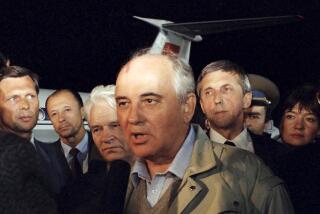Friend’s Suicide Saddens Retired Adm. Crowe : Military: ‘We grew to be quite close,’ former Joint Chiefs chairman says of Soviet Marshal Akhromeyev.
- Share via
WASHINGTON — For retired Adm. William J. Crowe Jr., former chairman of the Joint Chiefs of Staff, news of the suicide of Soviet Marshal Sergei F. Akhromeyev carried a special sadness.
Crowe, living in retirement in suburban Virginia, recalled Sunday how he and Akhromeyev had developed an unusual friendship that began with the Soviet officer’s first visit to the United States four years ago for the signing of a treaty eliminating U.S. and Soviet medium-range nuclear missiles.
They spent time together after that 1987 signing. Akhromeyev returned the following year, and Crowe, his U.S. counterpart, took him on an eight-day tour of military installations in Virginia, Texas and Oklahoma. Crowe later renewed his contacts with Akhromeyev on two visits to the Soviet Union.
“We grew to be quite close, really,” Crowe said in a telephone interview from Oklahoma, where he was visiting Sunday. “I received a letter from Sergei not more than six weeks ago.
“Although he has been pictured as a conservative, he was not a fanatic or a die-hard. He wanted changes in Soviet society, but perhaps they came a little too fast for him.”
Akhromeyev, 68, had been chief of the Soviet general staff before stepping down to become President Mikhail S. Gorbachev’s personal military adviser. Accused of having taken part in last week’s coup attempt, he left a suicide note reading: “Everything I have worked for throughout my life is being destroyed.”
Crowe speculated that Gorbachev’s resignation from the Communist Party “probably was a bitter blow to him.”
“Sergei wanted to see Soviet society moderated. He told me he wanted to see a kinder, gentler society and better relations with the United States, and he was in the forefront of that movement,” Crowe said.
“But he was a dedicated Communist nonetheless. More than once he told me that it’s very depressing to work for something your whole life and then have to start over. I’m certain he was depressed by the collapse of the old order. He didn’t want to see communism disappear.”
After Akhromeyev’s second visit to the United States in 1988, Crowe said his friend told him that he long had been convinced the United States would attack the Soviet Union.
“But he said he had changed his mind after experiencing the openness of American society and after touring our military bases and meeting our enlisted men and women,” Crowe recalled.
Akhromeyev was impressed by “the discipline of our armed forces within the framework of a democracy,” Crowe said.
“He thought it was remarkable that enlisted people were not afraid to speak out and were not intimidated by their officers.”
But Crowe said that his friend’s recent letter reflected “a sort of depression--he wasn’t satisfied with his life.”
Favoring changes while still cherishing traditional beliefs, “he was torn between two poles, and it’s evident that in the end he couldn’t reconcile them,” he said.
Profile
* Name: Sergei Fedorovich Akhromeyev
* Age: 68. Born May 5, 1923, to an ethnic Russian peasant family.
* Position: Marshal in Soviet military. President Mikhail S. Gorbachev’s personal military adviser; played an active role in U.S.-Soviet arms control negotiations.
* Career: Joined the Red Army when he was 17; was one of the last serving top officers to have fought in World War II. Joined Communist Party in 1943. Graduated from Military Academy of Tank Troops in 1952 and Military Academy of the General Staff in 1967. Commander at various fronts, 1941-45; chief of staff of a regiment, regiment commander, division commander, 1946-64. Held senior military command posts, 1967-72. Chief of administration of the general staff of the Soviet armed forces from 1979. First deputy chief of staff in 1979. Promoted to rank of marshal, became full member of Communist Party’s policy-making Central Committee in 1983. Named armed forces chief of staff and first deputy defense minister in 1984. Stepped down in 1988 for “health reasons” and became Gorbachev’s personal adviser on military affairs.
Sources: Biographical Dictionary of the Soviet Union, Times Wire Services
More to Read
Sign up for Essential California
The most important California stories and recommendations in your inbox every morning.
You may occasionally receive promotional content from the Los Angeles Times.








